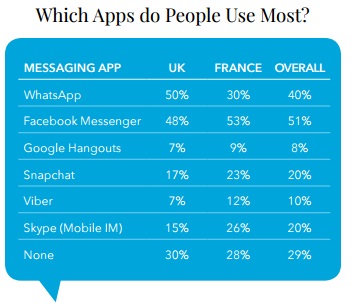53% of people who use mobile messaging apps such as Facebook Messenger and WhatsApp has interacted with a company via mobile messaging, or is open to doing so – as long as they can block brands they are not interested in according to a survey.

The research by Kenshoo comes on the back of Facebook Messenger enabling businesses to use artificial intelligence ‘bots’ to automate messaging interactions with consumers as well as permitting the sending of advertising messages.
In fact, only 28% of messaging users across the two countries said they are not interested in interacting with companies over this channel. But to avoid a consumer backlash, companies need to ensure messaging interactions are highly personalised and responsive.
The findings come from Kenshoo (www.Kenshoo.co.uk), the global leader in agile marketing, which commissioned a poll of 2,000 consumers split equally between the UK and France to explore the growing marketing opportunity presented by mobile messaging.
While messaging apps have until now been largely used for conversing with friends and family, it seems there is a willingness among consumers to use messaging to communicate with brands. Over half (51%) of messaging app users in Kenshoo’s study see messaging as faster and more immediate than email interactions with companies, while 48% feel it is going to be less hassle than voice calls.
Facebook, whose Facebook Messenger is now used by more than 11% of the world’s population, views messaging as an important medium for one-to-one communications between consumers and companies. Since it announced support for brands to build artificial intelligence bots to automate messaging interactions with consumers, over 30,000 have already been created. They are used for everything from sending delivery notifications and confirming reservations, to displaying specific pages from company websites (allowing consumers to scroll product information and images, hotel rooms or flights without leaving the messaging app). Bots even allow people to make payments and participate in games.
Businesses can now send sponsored marketing messages through Facebook Messenger to people they have had messaging conversations with. And they can buy Facebook ads that use call-to-actions such as ‘shop now’ or ‘learn more’ which consumers can click to automatically open up a Facebook Messenger conversation thread with the advertiser. Facebook has put the consumer in control however, because they have the power to choose which brands are allowed to message them.
According to the Kenshoo study, consumers are receptive to a variety of promotional interactions via messaging apps. Of those who are open to using messaging to communicate with businesses, 46% said they would be tempted by the prospect of receiving exclusive deals and offers, 25% said they would use messaging to respond to ads, 35% to participate in games and competitions in which they could win prizes. 24% said they would like to use messaging to receive updates on products and services they have expressed an interest in.
“Mobile messaging presents a new opportunity for businesses to connect directly with individual consumers – and potentially build long term customer relationships,” said Matt Vignieri, Kenshoo’s Managing Director for EMEA. “Many consumers can see the advantages too – but their expectations are high. They expect timely responses and will want communications to be personal to them and in context. If businesses get it wrong, then messaging could quickly turn into a channel for complaints. And because users can easily share negative experiences with their contacts, things could easily get from bad to worse.”
Messaging app users pointed to two other advantages of contacting businesses via mobile messaging:
• 15% liked the idea of setting up group interactions with brands – this might involve discussions around joint purchases, such as researching and booking a holiday or buying furnishings for a home or bringing in friends to comment on fashion buys
• 33% liked the fact that messaging apps retain the complete history of any conversations with a company so it is easily available in the app – no need to search through emails, or notes from telephone calls.
Of the 2,000 UK and French consumers polled as part of Kenshoo’s study, 71% use mobile messaging apps with 51% saying they use Facebook Messenger and 40% using WhatsApp. Snapchat and Skype (for messaging on a phone) are each used by 20%. 29% said they did not use messaging apps.
Download the Kenshoo study ‘Mobile Messaging Apps – A Marketing Opportunity for Brands?’
About the survey
Kenshoo commissioned an online survey of 2,000 consumers split equally between the UK and France. The survey was conducted through Toluna QuickSurveys during December 2016.
www.Kenshoo.com
